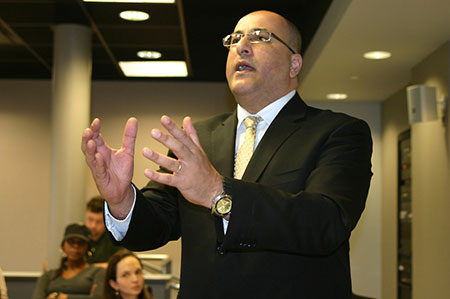Israel’s Consul General explains country positioning
Israel’s Consul General to New York Ambassador Ido Aharoni, MA ’90, discussed his career in country positioning, frequently referred to as nation branding, as well as his experiences at Emerson College with graduate students in the Global Journalism and Global Finance classes on October 11.

As Consul General, Aharoni represents the State of Israel to communities in the tri-state area, including New York, New Jersey, and Connecticut. He manages Israel’s reputation so the country can attract new investments, talent, and tourism, and boost its competitiveness in today’s market.
Aharoni started the conversation by explaining place positioning. He told students to determine “what is it you possess and what distinguishes you from your competition,” he said. Places like Nashville and Las Vegas have figured out their relative advantage, Aharoni pointed out. Nashville is about country music and Las Vegas has been labeled Sin City. He then told students to identify their competitive edge, “what is it you bring to the table and what is the offering your brand is making to the consumer,” he said. “Once you have this information, then there’s the real challenge, ”Aharoni said to the students. “Communicating it to a relevant audience.”
Traditionally, governments unilaterally broadcasted their views, position and assets. They sent the same message to everyone with the goal of appearing on the national and international stage, said Aharoni. The system has since then shifted to narrowcasting. Institutions and branders are not only looking for that massive national audience but to engage and create conversation in niche markets. Aharoni explained that this shift is alarming to governments because they do not know how to engage in these meaningful conversations.
Up until 2002, the Consulate of Israel did not look at the country as a brand—in fact, very few countries did. In 2004, the first phase of Israel’s strategy as a brand was launched. Aharoni and his team selected one niche market—people who care about architecture and design—and sent a group of 12 writers from North America to cover Israeli architecture. “Obviously, each writer has an opinion about the geopolitical situation in Israel, but they all share the passion of architecture and this is why they came,” Aharoni said. After pursuing the architecture and design market, new markets were targeted like wine, cuisine, and sports.
“The point is at the end of the day you want to be competitive because you want to do well,” said Aharoni. “The competition is tough. Countries want to increase their profiles to attract investors, expose their culture, and most importantly bring in tourism. Why tourism? Because it is experiential,” he said.
Categories